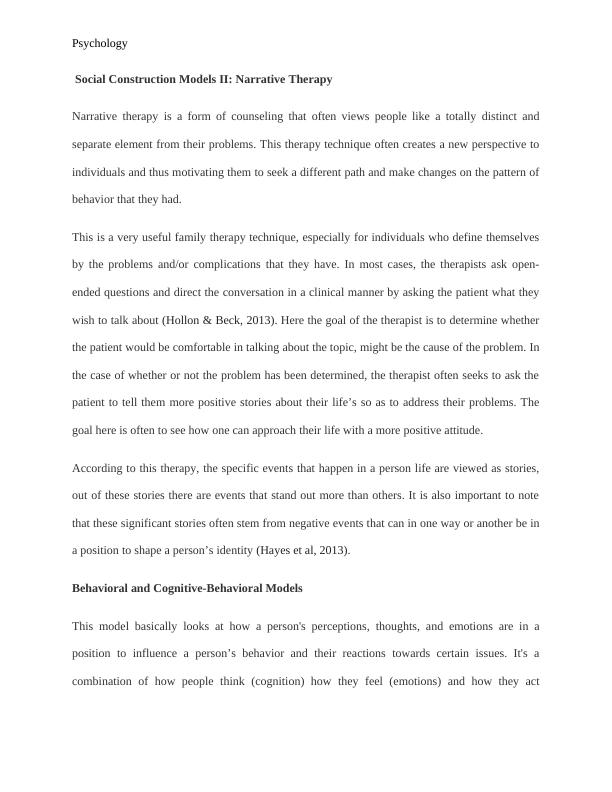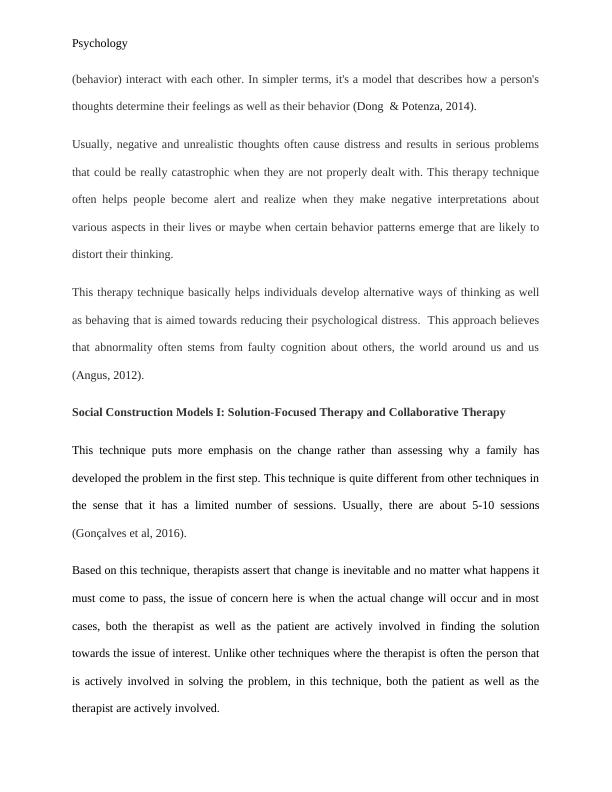Social Construction Models II: Narrative Therapy
Added on 2023-01-23
6 Pages1116 Words80 Views
Psychology
Counseling
Name
Professors’ name
Institution
Date
Counseling
Name
Professors’ name
Institution
Date

Psychology
Social Construction Models II: Narrative Therapy
Narrative therapy is a form of counseling that often views people like a totally distinct and
separate element from their problems. This therapy technique often creates a new perspective to
individuals and thus motivating them to seek a different path and make changes on the pattern of
behavior that they had.
This is a very useful family therapy technique, especially for individuals who define themselves
by the problems and/or complications that they have. In most cases, the therapists ask open-
ended questions and direct the conversation in a clinical manner by asking the patient what they
wish to talk about (Hollon & Beck, 2013). Here the goal of the therapist is to determine whether
the patient would be comfortable in talking about the topic, might be the cause of the problem. In
the case of whether or not the problem has been determined, the therapist often seeks to ask the
patient to tell them more positive stories about their life’s so as to address their problems. The
goal here is often to see how one can approach their life with a more positive attitude.
According to this therapy, the specific events that happen in a person life are viewed as stories,
out of these stories there are events that stand out more than others. It is also important to note
that these significant stories often stem from negative events that can in one way or another be in
a position to shape a person’s identity (Hayes et al, 2013).
Behavioral and Cognitive-Behavioral Models
This model basically looks at how a person's perceptions, thoughts, and emotions are in a
position to influence a person’s behavior and their reactions towards certain issues. It's a
combination of how people think (cognition) how they feel (emotions) and how they act
Social Construction Models II: Narrative Therapy
Narrative therapy is a form of counseling that often views people like a totally distinct and
separate element from their problems. This therapy technique often creates a new perspective to
individuals and thus motivating them to seek a different path and make changes on the pattern of
behavior that they had.
This is a very useful family therapy technique, especially for individuals who define themselves
by the problems and/or complications that they have. In most cases, the therapists ask open-
ended questions and direct the conversation in a clinical manner by asking the patient what they
wish to talk about (Hollon & Beck, 2013). Here the goal of the therapist is to determine whether
the patient would be comfortable in talking about the topic, might be the cause of the problem. In
the case of whether or not the problem has been determined, the therapist often seeks to ask the
patient to tell them more positive stories about their life’s so as to address their problems. The
goal here is often to see how one can approach their life with a more positive attitude.
According to this therapy, the specific events that happen in a person life are viewed as stories,
out of these stories there are events that stand out more than others. It is also important to note
that these significant stories often stem from negative events that can in one way or another be in
a position to shape a person’s identity (Hayes et al, 2013).
Behavioral and Cognitive-Behavioral Models
This model basically looks at how a person's perceptions, thoughts, and emotions are in a
position to influence a person’s behavior and their reactions towards certain issues. It's a
combination of how people think (cognition) how they feel (emotions) and how they act

Psychology
(behavior) interact with each other. In simpler terms, it's a model that describes how a person's
thoughts determine their feelings as well as their behavior (Dong & Potenza, 2014).
Usually, negative and unrealistic thoughts often cause distress and results in serious problems
that could be really catastrophic when they are not properly dealt with. This therapy technique
often helps people become alert and realize when they make negative interpretations about
various aspects in their lives or maybe when certain behavior patterns emerge that are likely to
distort their thinking.
This therapy technique basically helps individuals develop alternative ways of thinking as well
as behaving that is aimed towards reducing their psychological distress. This approach believes
that abnormality often stems from faulty cognition about others, the world around us and us
(Angus, 2012).
Social Construction Models I: Solution-Focused Therapy and Collaborative Therapy
This technique puts more emphasis on the change rather than assessing why a family has
developed the problem in the first step. This technique is quite different from other techniques in
the sense that it has a limited number of sessions. Usually, there are about 5-10 sessions
(Gonçalves et al, 2016).
Based on this technique, therapists assert that change is inevitable and no matter what happens it
must come to pass, the issue of concern here is when the actual change will occur and in most
cases, both the therapist as well as the patient are actively involved in finding the solution
towards the issue of interest. Unlike other techniques where the therapist is often the person that
is actively involved in solving the problem, in this technique, both the patient as well as the
therapist are actively involved.
(behavior) interact with each other. In simpler terms, it's a model that describes how a person's
thoughts determine their feelings as well as their behavior (Dong & Potenza, 2014).
Usually, negative and unrealistic thoughts often cause distress and results in serious problems
that could be really catastrophic when they are not properly dealt with. This therapy technique
often helps people become alert and realize when they make negative interpretations about
various aspects in their lives or maybe when certain behavior patterns emerge that are likely to
distort their thinking.
This therapy technique basically helps individuals develop alternative ways of thinking as well
as behaving that is aimed towards reducing their psychological distress. This approach believes
that abnormality often stems from faulty cognition about others, the world around us and us
(Angus, 2012).
Social Construction Models I: Solution-Focused Therapy and Collaborative Therapy
This technique puts more emphasis on the change rather than assessing why a family has
developed the problem in the first step. This technique is quite different from other techniques in
the sense that it has a limited number of sessions. Usually, there are about 5-10 sessions
(Gonçalves et al, 2016).
Based on this technique, therapists assert that change is inevitable and no matter what happens it
must come to pass, the issue of concern here is when the actual change will occur and in most
cases, both the therapist as well as the patient are actively involved in finding the solution
towards the issue of interest. Unlike other techniques where the therapist is often the person that
is actively involved in solving the problem, in this technique, both the patient as well as the
therapist are actively involved.

End of preview
Want to access all the pages? Upload your documents or become a member.
Related Documents
Theories of Counseling: Cognitive Behavioral Therapy and Gestalt Therapylg...
|10
|3133
|485
Cognitive Behavioral Therapy: Assumptions, Goals, and Techniqueslg...
|5
|1447
|381
APPLICATION OF COGNITIVE BEHAVIORAL THERAPY.lg...
|10
|2595
|436
Theories of Counsellinglg...
|10
|2576
|1
Cognitive Therapy | Reportlg...
|5
|1042
|17
The Cognitive-behavioral therapylg...
|7
|1731
|17
